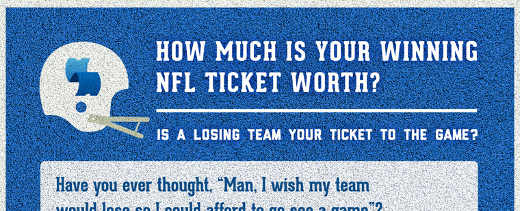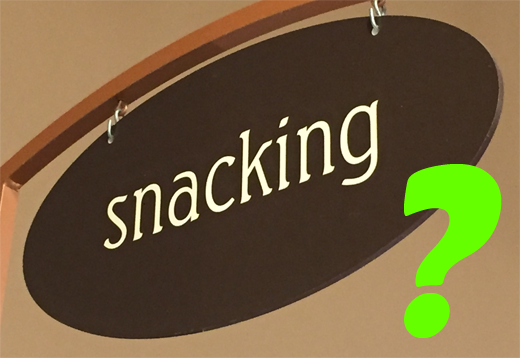Football Teams Winning And The Impact On Ticket Cost by TickPick
As the saying goes... on any given Sunday, any team in the NFL can beat any other team. What late NFL commissioner Bert Bell said decades ago still rings true today, as can be seen with a recent game involving my beloved Patriots and a certain team from Philadelphia. This parity in competition is good for the game of football, but not always good for the fans, especially if they can't get in to see their team due to the increasing cost of NFL tickets.
As someone who had Patriots season tickets during very lean years for the team, as well as traveling to see the team in other NFL cities where it was either extremely easy or hard to get tickets, I have known first-hand the impact on team performance and the impact on going to a football game. When the folks at TickPick created this infographic on winning and the impact on ticket cost for all NFL teams, I had to see it, and they have allowed me to share it with you here.
Click on the sample of the infographic above, or click this link to view the NFL football ticket cost infographic from TickPick full-sized.
As you can see, there's a variety of percent increases in ticket values and costs based on if a football team is a winner or not. What's also interesting to see is the difference in ticket costs. Though the value and cost of New England Patriots tickets can increase by 78% based on their winning, the cost at $479.63 is less than the Chicago Bears at $770.42, whose price only increases by 53%. Knowing a little about both teams, the Patriots base ticket costs are much less to begin with than the football team who plays a couple of blocks from me.
Where this infographic is for football, it is telling for all sports and events. Next baseball season it will be a lot easier and affordable to get a ticket to see David “Big Papi” Ortiz play in his final year here against the Chicago White Sox in US Cellular Field than it will at Fenway Park in Boston. I learned this first-hand when I moved to Chicago the day the Red Sox were playing the White Sox and everywhere I looked I saw Red Sox jerseys, a surreal scene to say the least. Other impacts, including stadium size and season ticket base, play into this as well.
Enjoy this infographic and I welcome your thoughts and stories in the comments to this post if you have experienced this as well and have traveled to see your team in another city due to ticket cost. Thank you to TickPick for letting me share this infographic.
This is from The Hot Iron, a journal on business and technology by Mike Maddaloni.
Did you enjoy this? Subscribe to The Hot Iron by RSS/XML feed or Read by Email.
Diversions • Guest Post • Strategize • (0) Comments • Permalink
Most People Spend Most Of Their Time Around Their Job

It came to me a while back, something I guess I always knew subconsciously but only then came to the forefront of my mind – most people spend most of their time around their job. I then decided to put fingers to technology to see if I was right, and here’s my analysis and further thoughts on it.
Jobs and all their trappings
When thinking about how we spend our time, our jobs tend to be at the top of our list. This is of course assuming we don’t sleep most of our lives, but I digress. The job itself is the major time hoarder, assuming the typical 8-hour day. But if your day is anything but typical, it in itself is probably more than 8 hours, give or take a few minutes to a few hours.
As the TV infomercials say, “But wait, there’s more!” There’s the commute to work, both to and from it. You then need to prepare to go to work – wake up, shower (hopefully), eat and of course thinking about work. After work, there is probably some decompression, which involves more thought. If you work for the bare-minimum tech-savvy company, you can probably check your work email on your mobile device, and that adds up quickly, whether it is during the day or off-hours, including weekend. Then there's time devoted to things like doctor's appointments if things aren't so great on the job, but I don't have to go down that path here, do I?
Speaking of those off-hours and weekends, you are also thinking about work in addition to being connected to it. You may also be shopping for work, whether it is clothes, food or other supplies to get you through the day. And let’s face it, you may even take time after (or before) hours and on the weekends to actually do work, taking those time-consuming thoughts into even more time consuming actions.
So what’s your point Mike?
Now that I have set a somewhat somber point, you may be asking why? Why even bring this up?
Where I have thought about this very topic for a while, I wanted to write it out to make it real, tangible, and in my own face, and as a result in yours as well. By doing so, it is a realization that this will play into my upcoming goals for the new year. Where this time allotment towards my job may not be a direct or the primary input to my goals and decisions, but acknowledging it, I am realizing it will have some impact on it. From what I buy to where I live to what I do outside of work to whatever I may not have even thought of, the amount of time that my job currently occupies my time will come into consideration.
This time consumption perhaps consumes you as well – hopefully less, but perhaps even more. And let’s face it, it consumes most everyone. I say most everyone as I realize there are those who may not have to or want to work as much, and have the ability to disconnect from it. It may be because they are wealthy, live a simpler life, have a business or job that does not require as much of their time, work part-time but make enough to make them happy, or something else I couldn’t possibly fathom, but would love to.
Even if your job takes up most of your time, that may be ok, providing you love it, or maybe just a strong like. Or it’s convenient to where you live so your commute time is shorter. Or whatever it is or are, when you look at it written out, I hope you are at a minimum content with it.
The lay of the land
Now that I have painted the picture, do I (or you) want to hang it on the wall, or change it? I am not trying to draw any conclusions here – just simply putting it out as I said earlier, but reserving the right to refer to this in future writings.
I welcome your thoughts on this in the comments to this post… and please leave out any specifics about your job in those comments!
This is from The Hot Iron, a journal on business and technology by Mike Maddaloni.
Did you enjoy this? Subscribe to The Hot Iron by RSS/XML feed or Read by Email.
Blogging • Business • Diversions • Strategize • Thrive • (0) Comments • Permalink
All Progress Requires Change But Not All Change Is Progress

Recently a friend posed this question to me, “hey Mr. Blogger, answer this: all progress requires change, but not all change is progress.” Yes, asked me it in just like that, and they did not tell me why they were asking me or if the statement came from somewhere other than their own brain.
Needless to say, their question got me thinking. I really didn’t care about the source and why as much as the statement itself… so much that it compelled me to write this.
When I first heard this, 2 things came to mind. The first was a quote from the song “Freewill” by the band Rush, which goes, “if you choose not to decide, you still have made a choice.” Don’t ask me how this association was specifically made; I have always loved that line as it is one that frequently comes to mind when faced with a difficult situation or choice, or after I was and I may not have chosen or waited too long and options may have gone away.
The second thing that came to mind was the pure definitions of each word – progress and choice. Maybe it has something to do with growing up a few miles from the home of the original American dictionary. Where that is part of it, I always like to set my foundation from which to build a thought and idea from. According to Merriam-Webster, the definition of progress is movement forward or towards a place; the process of improving or developing something over a period of time. The word change is the act, process, or result of changing; an alteration, transformation, substitution. There is more depth to each definition and each word is linked to its full definition.
Gut reaction followed by reflection
Going into writing this, I agreed with the statement. I equate progress to forward motion and accomplishment, and change to something being a catalyst for it, though forward motion and accomplishment is not necessarily progress in itself. You can change your surroundings, but it doesn’t necessarily equate to progress in your life. Each one in themselves has tangible qualities, but only progress has the positive intangibles of pride and satisfaction. This speaks to why the organizers of the 1933-1934 Chicago’s World Fair likely nicknamed it “A Century of Progress” and not “A Century of Change.”
As I thought about this more, I found these 2 words – change and progress – need each other. In order to progress and move forward, you must act, evaluate and most likely change something in order to move forward. Whether it’s where you live, a job, a customer or whatever, many times doing what you did before to get you where you are won’t take you any further. That change doesn’t have to be monumental – it may just be a tweak – but something different is often needed.
Change in itself is always happening – whether the weather, people, etc. – and reacting to that change with appropriate actions – big or small – will lead to progress, not the mere change itself.
Of course this is how I interpret this statement today. In the future, with whatever happens in my life – and changes and progresses – will most likely have an impact on this analysis. At least for now, I hope this addresses my friend’s query. It has definitely adjusted my thinking as now I will be looking for progress in my life. It this statement impacted your thinking – or not – please share your thoughts in the comments to this post.
This is from The Hot Iron, a journal on business and technology by Mike Maddaloni.
Did you enjoy this? Subscribe to The Hot Iron by RSS/XML feed or Read by Email.
Business • Diversions • Strategize • (2) Comments • Permalink
My Takeaways From The Book Evolutionary Eating By Dr. Theresa Nesbitt
Over the summer I was seriously considering weight and diet counseling. As, well, let's just say I need to lose a few pounds, and with the increasing demand of little kids – plus the fact I am not getting any younger – it was more than time to take action.
When I talked with a colleague who is also a doctor about this, he asked me if, before I committed time and money to a program, I could commit US $15 on a book. As you cant even get a mediocre mixed drink in some Chicago bars for that, I said, “why not?” It was then that he recommended I read a book written by a friend of his, Dr. Theresa Nesbitt, titled Evolutionary Eating: How We Got Fat and 7 Simple Fixes.
As the book was recommended by someone I trust, I bought it. But I have to admit – by the title alone, which I thought was cliché for a health book, I probably wouldn't have otherwise bought it. But I did, and I am glad I did. And it has worked for me too, but I will save that for the end of this post.
So it is probably needless to say that I had several take-aways from this book, and here's some of the top ones I'd like to share:
We Never Really Learned Everything About Eating – Looking back on growing up, plus raising my own little angels, most of what we teach our kids about eating is more logistical – use utensils, don't put food in your hair, chew with your mouth closed – but we don't have as much focus on when to eat, what to eat and why.
Eat 3 Meals A Day At Routine Times – By eating consistently, or as consistently as possible, your body “knows” when to process food coming in and when to process stored fat, and by doing so you will use that excess stored energy and lose weight. I had an uncle who did this, eating 3 meals a day of the food he grew and raised and he lived to his mid 90's.
Keep It Real By Eating Real Food – Stick to basic and real foods and less or no processed or manufactured foods, or as Dr. Nesbitt calls “food forgeries” as our bodies are built for processing natural foods and not artificial or manufactured ingredients, flavors and additives. The original TV chef, Julia Child, always cooked with real butter, lard and wine and she lived to her 90's as well.
No Snacking – If you eat 3 meals a day only, you are thereby not snacking. Of course this goes beyond everything out there in society, at least modern American society. This for me has been personally tough, especially with earlier said angels who are ever growing and snacking. But by me snacking I too am ever growing, but in a bad way, and by not snacking, that has subsided.
How Vegetable Oil Is Made – Vegetable oil is supposed to be better than other oils, but they don't necessarily squeeze veggies to get the oil, unlike with olive oil. A chemical process is used to get it, and where the book introduces this I have done my own research as well. I'll stick with olive oil, or as I have been doing, I will forego oil altogether and use a variety of natural foods to add flavor.
Any Change Requires Willpower – This is probably the only thing I disagree with the author on. She states that by learning how to eat better, no willpower is involved. For someone like myself who has been eating the same way for almost half a century, willpower isn't only involved, it is direly needed! In the past I have lost weight, but always ate the same, and then it was more involved with a high level of exercise. When I stopped exercising, the weight came right back.
Some of these are of the 7 “simple fixes” that Dr. Nesbitt offers, and if you are intrigued as to what they all are, I recommend getting a copy of this book. As for the book as a whole, it is a very good and easy read – not intense, educational and supportive with a touch of humor, all the while not being too preachy. I recommend Evolutionary Eating not only for someone looking to lose weight, but for anyone looking to eat better or to support someone losing weight.
As for myself, I read the book over summer and it really resonated with me. I have changed my diet quite a bit, eating more salads without dressing, and cutting out most all breads. I still eat pizza and pasta, but I try to eat less of it. It has been far from perfect, and sometimes a struggle, but when I am hungry a coffee or seltzer will do the trick. Since simmer, I have lost about 25 pounds. I have a lot more to lose, but I am pleased with the results so far!
I have shared this book with my immediate family, and have given my copy to a friend. If you read Evolutionary Eating, I welcome your thoughts on it in the comments of this post.
This is from The Hot Iron, a journal on business and technology by Mike Maddaloni.
Did you enjoy this? Subscribe to The Hot Iron by RSS/XML feed or Read by Email
Book Take-Aways • Strategize • Thrive • (0) Comments • PermalinkWeb Content Horror Stories For Halloween

Come gather children and adults, huddle by the flickering fire, sip on hot apple cider, all while I, in the shadowy light of the fire, tell stories this Halloween season – true stories, horror stories of Web site content!
The Scream
Many, many years ago I worked for a tech consulting firm that was undergoing rebranding. This exciting process was to include a new look to the Web site. As we were in the business of building Web sites, we were going to build out the ability to maintain the site as well. Note this was years before the term content management system, or CMS, was ever in vogue.
The project was assigned to myself and another senior guy I will call Rocky. There was a little bit of competitiveness between us, partly due to our own cockiness and confidence in our abilities, not to mention he was a Packers fan and I was a Patriots fan, but I digress. In some regards I think that's why both of us were put on the project. We would be building the technology, integrating the new branding and graphic design from the marketing firm and designing sample content, as the president of the company would be writing all of the content, as this is what he told us.
Despite our attitudes, Rocky and I worked very well together. We built out the front-end, back-end, database and sample “lorem ipsum” content. And we did it all on time.
Here's where the story gets scary... the president asked to meet with us at a predefined time in the project plan to review our progress. To his surprise – which quickly and surprising to us we saw on his face – we showed him a, for the most part, complete Web site. All it would need is a few small adjustments... and a lot of content.
Though we were in a brightly-lit office, the room got suddenly dark and eerie. The typically congenial voice of the president got heavy and creepy. Then, timed with a hypothetical clap of thunder, the screaming began.
As time and attempts to forget about this have clouded specifics, in general our frightening leader said, “how dare you finish on time when I didn't even start to write the content!” What? We were numb to the proverbial “second one” he was ripping into us, and it seemed like hours afterwards we were still stunned. Then, after he left, we laughed, hysterically, for what also seemed like hours.
The Original Blank Page
It was a work day like any other, multitasking away in and on my Web consulting business. A friendly chime sounded as my often co-collaborator and an amazing graphic designer n her own right – we'll cal her Sierra – called as we were partnering on a Web site proposal. It was mostly written, reviewing back and forth by email, and we were meeting to make a final walkthrough together before submitting it to the prospective client.
As we went through the proposal line-by-line, word-by-word, it was almost as if a light springy piano tune was playing in the background by none other than Liberace himself. As we got through the end of the document, where we listed references and example Web sites, we both paused as we were reviewing the list. Even though we were on the phone, over 1,500 miles apart, it was as if we were in the same room, pointing to the same spot in the document.
Just as Sierra began to say what I was thinking, it was as if Liberace was vaporized to dust and the Phantom of the Opera took over at the bench and with the flick of some switch, the piano became a pipe organ, and the Phantom played the most sinister music known. Then Sierra spoke, "THIS Web site... when was the last time you looked at it?” The silence over the phone was broken by more organ music, which was timed with each of us typing the Web site's URL into our Web browsers.
As we navigated beyond the home page the music got louder and more daunting, as we looked at empty page after empty page, with nothing on them at all – not one word of content! The shrieking in our voices was beyond our control. This Web site had been live for almost a year with several completely blank pages, to which we could not believe. My gut reaction took over, as I logged into the CMS for the site and placed some basic “coming soon” messages. There was no way we could use this great looking Web site with blank sub-pages as an example of the great work we did. Where the placeholder text was not the ideal situation, it was really all we could do, and in the end turned out to be sufficient as we won the proposal.
Only a Few of Many Stories
Over the years I have encountered Web content horror stories, almost from the time I started creating Web sites. I share these stories not to criticize people or to make fun of them, rather to serve as a cautionary tale of the importance of content development for Web sites. It is not something to do casually – or not at all – and is vital to the success of your site.
Boo!
This is from The Hot Iron, a journal on business and technology by Mike Maddaloni.
Did you enjoy this? Subscribe to The Hot Iron by RSS/XML feed or Read by Email.
Blogging • Build • Business • Strategize • Web Design • (0) Comments • Permalink







